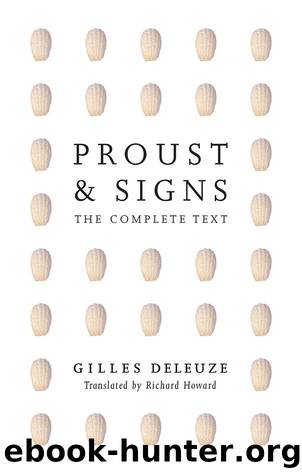Proust And Signs: The Complete Text (Theory Out Of Bounds) by Gilles Deleuze

Author:Gilles Deleuze [Deleuze, Gilles]
Language: eng
Format: azw3
Tags: Literary Criticism
ISBN: 9780816686438
Publisher: University of Minnesota Press
Published: 2014-09-25T16:00:00+00:00
It may be that Proustâs critique of philosophy is eminently philosophical. What philosopher would not hope to set up an image of thought that no longer depends on the goodwill of the thinker and on a premeditated decision? Each time we propose a concrete and dangerous thought, we know that it does not depend on an explicit decision or method but on an encountered, refracted violence that leads us in spite of ourselves to Essences. For the essences dwell in dark regions, not in the temperate zones of the clear and the distinct. They are involved in what forces us to think; they do not answer to our voluntary effort; they let themselves be conceived only if we are forced to do so.
Proust is a Platonist, but not in the vague sense, not because he invokes essences or Ideas apropos of Vinteuilâs little phrase. Plato offers us an image of thought under the sign of encounters and violences. In a passage of the Republic, Plato distinguishes two kinds of things in the world: those that leave the mind inactive or give it only the pretext of an appearance of activity, and those that lead it to think, which force us to think (VII, 523bâ25b). The first are the objects of recognition; all the faculties are exercised upon these objects, but in a contingent exercise, which makes us say âthat is a finger,â that is an apple, that is a house, and so on. Conversely, other things force us to think: no longer recognizable objects, but things that do violence, encountered signs. These are âsimultaneously contrary perceptions,â Plato states. (Proust will say: sensations common to two places, to two moments.) The sensuous sign does us violence: it mobilizes the memory, it sets the soul in motion; but the soul in its turn excites thought, transmits to it the constraint of the sensibility, forces it to conceive essence, as the only thing that must be conceived. Thus the faculties enter into a transcendent exercise, in which each confronts and joins its own limit: the sensibility that apprehends the sign; the soul, the memory, that interprets it; the mind that is forced to conceive essence. Socrates can rightly say: I am Love more than the friend, I am the lover; I am art more than philosophy; I am constraint and violence, rather than goodwill. The Symposium, the Phaedrus, and the Phaedo are the three great studies of signs.
But the Socratic demon, irony, consists in anticipating the encounters. In Socrates, the intelligence still comes before the encounters; it provokes them, it instigates and organizes them. Proustâs humor is of another nature: Jewish humor as opposed to Greek irony. One must be endowed for the signs, ready to encounter them, one must open oneself to their violence. The intelligence always comes after; it is good when it comes after; it is good only when it comes after. As we have seen, this distinction between Proust and Platonism involved many more differences. There is no Logos; there are only hieroglyphs.
Download
This site does not store any files on its server. We only index and link to content provided by other sites. Please contact the content providers to delete copyright contents if any and email us, we'll remove relevant links or contents immediately.
The Power of Myth by Joseph Campbell & Bill Moyers(1055)
Half Moon Bay by Jonathan Kellerman & Jesse Kellerman(979)
Inseparable by Emma Donoghue(976)
A Social History of the Media by Peter Burke & Peter Burke(968)
The Nets of Modernism: Henry James, Virginia Woolf, James Joyce, and Sigmund Freud by Maud Ellmann(891)
The Spike by Mark Humphries;(809)
A Theory of Narrative Drawing by Simon Grennan(774)
The Complete Correspondence 1928-1940 by Theodor W. Adorno & Walter Benjamin(773)
Culture by Terry Eagleton(770)
Ideology by Eagleton Terry;(731)
Farnsworth's Classical English Rhetoric by Ward Farnsworth(711)
World Philology by(711)
Bodies from the Library 3 by Tony Medawar(707)
Game of Thrones and Philosophy by William Irwin(707)
High Albania by M. Edith Durham(698)
Adam Smith by Jonathan Conlin(686)
A Reader’s Companion to J. D. Salinger’s The Catcher in the Rye by Peter Beidler(675)
Comic Genius: Portraits of Funny People by(649)
Monkey King by Wu Cheng'en(646)
